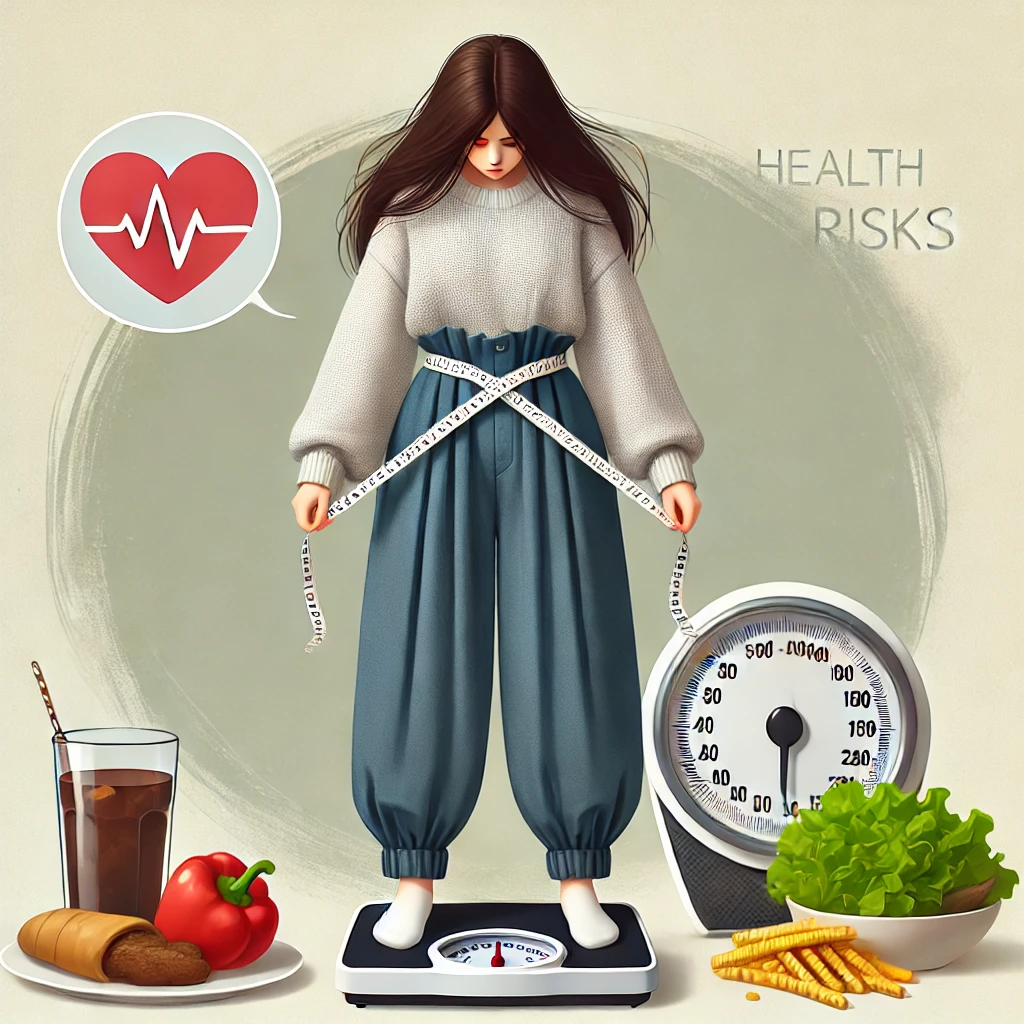“The Dangers of Crash Dieting and Extreme Weight Loss Methods”
Crash dieting and extreme weight loss methods may promise quick results, but they come with serious health risks. Learn about the dangers, long-term consequences, and healthier alternatives to losing weight safely.
Introduction:
In the pursuit of rapid weight loss, many people turn to crash diets and extreme weight loss methods. These approaches often involve severe calorie restrictions, eliminating entire food groups, or relying on unproven supplements. While they may lead to quick weight loss, the consequences can be severe and long-lasting. This article explores the dangers of crash dieting and extreme weight loss methods, highlighting the risks they pose to physical and mental health.
>Health Risks of Crash Dieting:
1.Nutritional Deficiencies;
Crash diets drastically cut calorie intake, often leading to a lack of essential nutrients such as vitamins, minerals, and proteins. When the body does not get enough nutrients, it can result in:
- Weak immune system – making you more susceptible to illnesses.
- Hair loss and brittle nails – due to a lack of essential vitamins like biotin and iron.
- Bone weakness – caused by insufficient calcium and vitamin D intake.
2.Muscle Loss Instead of Fat Loss;
When the body is starved, it starts breaking down muscle for energy instead of burning fat. This results in a slower metabolism, making it even harder to maintain weight loss in the long run. Losing muscle mass can also make you feel weak and reduce overall body strength.
3.Dehydration and Electrolyte Imbalance;
Many extreme diets cause rapid water loss rather than actual fat loss. This can lead to dehydration, which may cause dizziness, headaches, and extreme fatigue. Electrolyte imbalances can disrupt heart function, leading to serious conditions such as irregular heartbeats or even cardiac arrest.
>Mental and Emotional Consequences:
1.Increased Risk of Eating Disorders;
Extreme dieting can create an unhealthy relationship with food, leading to eating disorders such as anorexia nervosa and bulimia. People who follow crash diets often experience guilt, anxiety, and obsessive thoughts about food, which can severely impact mental health.
2.Mood Swings and Irritability;
A lack of proper nutrients affects brain function, leading to mood swings, irritability, and even depression. Many people who attempt extreme weight loss methods experience constant frustration due to hunger and low energy levels.
3.Loss of Concentration and Productivity;
With fewer calories to fuel the brain, cognitive function declines. This can result in difficulty concentrating, memory problems, and reduced productivity at work or school.
>Long-Term Consequences of Extreme Weight Loss:
1.Slower Metabolism and Weight Gain;
Crash diets may lead to initial weight loss, but the body adapts by slowing down metabolism. Once normal eating resumes, weight gain often happens quickly, sometimes leading to more weight gain than before. This cycle, known as yo-yo dieting, can make future weight loss even harder.
2.Damage to Internal Organs;
Severe calorie restriction puts stress on vital organs, including the heart, liver, and kidneys. Over time, this can increase the risk of heart disease, kidney failure, and liver damage.
3.Hormonal Imbalance;
Extreme dieting disrupts hormone production, affecting metabolism, reproductive health, and overall well-being. Women, in particular, may experience irregular menstrual cycles or even fertility issues due to drastic weight loss.
>Safer and Healthier Alternatives:
1.Balanced Diet with Portion Control;
Instead of crash dieting, focus on a balanced diet that includes:
- Lean proteins like chicken, fish, and legumes.
- Healthy fats from nuts, seeds, and olive oil.
- Whole grains such as brown rice and quinoa.
- Plenty of fruits and vegetables for vitamins and fiber.
2.Regular Physical Activity;
Incorporate exercise into your routine, such as:
- Strength training to build muscle and boost metabolism.
- Cardio exercises like walking, running, or cycling.
- Yoga or stretching for flexibility and mental relaxation.
3.Hydration and Mindful Eating;
Drinking enough water helps with digestion, reduces cravings, and keeps you energized. Practicing mindful eating—chewing slowly, avoiding distractions, and recognizing hunger signals—can prevent overeating and promote a healthier relationship with food.
4.Seeking Professional Guidance;
If you want to lose weight safely, consult a nutritionist or dietitian who can design a plan tailored to your needs. Avoid fad diets and instead focus on long-term, sustainable lifestyle changes.
Conclusion:
While crash diets and extreme weight loss methods may seem tempting, they come with serious health risks that can outweigh the benefits. Nutritional deficiencies, muscle loss, emotional distress, and long-term metabolic damage are just a few of the dangers associated with rapid weight loss. Instead of risking your health, choose a balanced diet, regular exercise, and professional guidance for sustainable and healthy weight management.



“Well explained, made the topic much easier to understand!”